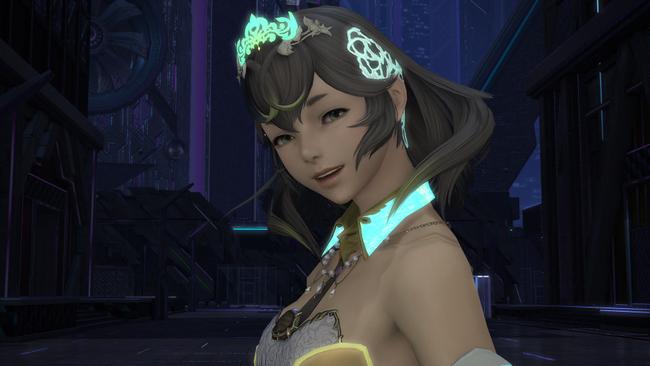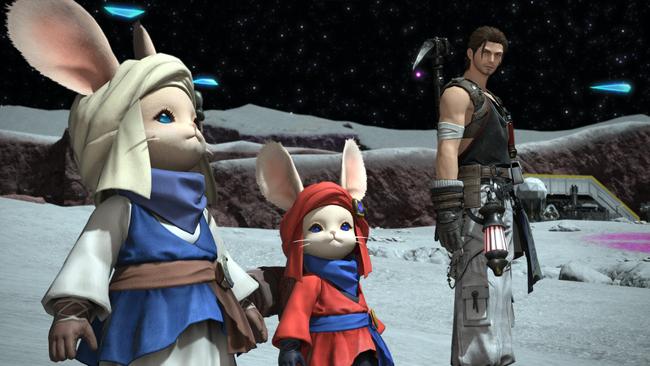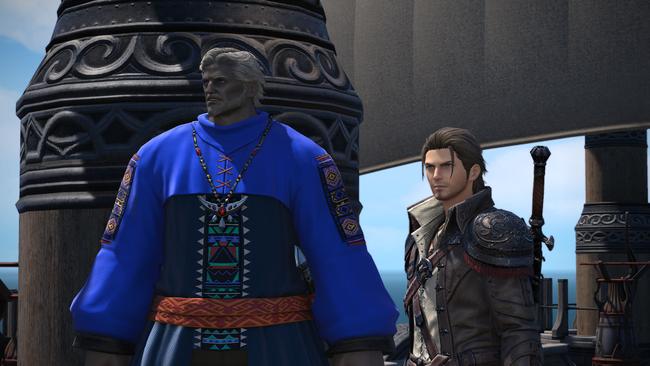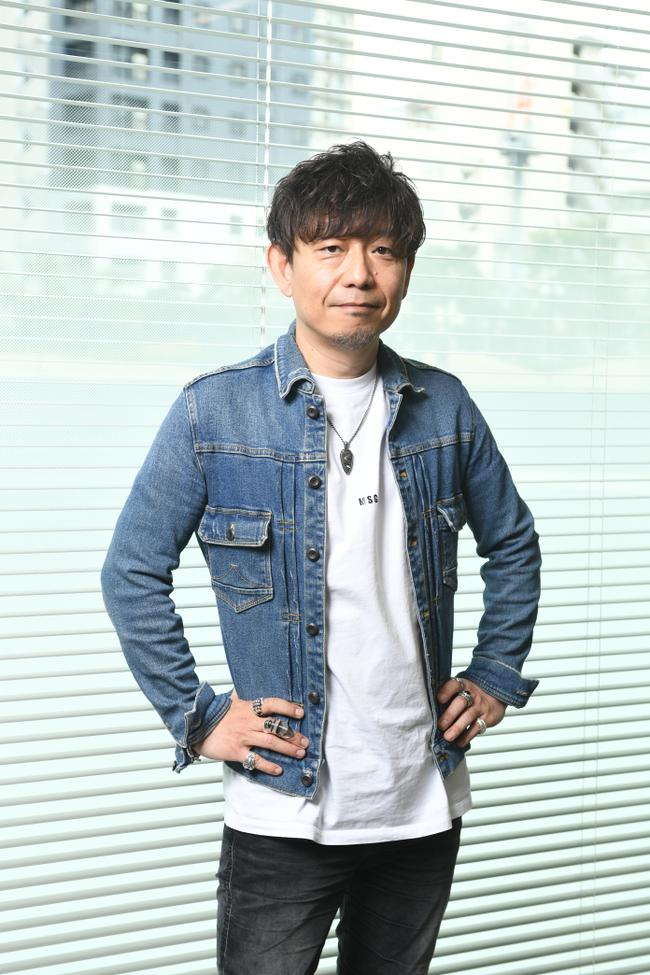
At Anime Expo, Naoki Yoshida reflects on his past as he looks forward to the future
Naoki Yoshida's attendance at this year's Anime Expo was never something Square Enix had originally intended. While the company is no stranger to having a presence at North America's largest anime convention, most years that presence has revolved around the company's products outside of gaming - or, when games were a focus, on multimedia projects such as Infinity Strash: Dragon Quest The Adventures of Dai, or adaptations of their video game properties such as the relatively recent The World Ends With You and NieR Automata anime series'. "Yoshi-P" and his attendance wasn't an idea that Square Enix came up with themselves, but rather came to fruition due to an invite from the SPJA - the Society for the Promotion of Japanese Animation, the organizers for Anime Expo from its conception. They wanted Yoshida to attend this year's Anime Expo as a guest of honor, and hold a panel about his life and influences.
While most players will know Naoki Yoshida as "Yoshi-P", Producer of Final Fantasy XIV and XVI, very little of his Anime Expo panel was about Square Enix and Final Fantasy at all. Attendees were able to hear a number of anecdotes about the manga, anime and games that Yoshida grew up with, and some of the titles that helped launch his career - including the canceled Far East of Eden, and his directorial debut at Hudson Soft with Bomberman 64: The Second Attack. We got to hear his exasperation that they'd even let people attend Anime Expo if they haven't seen Gundam; as well as the "trauma" he endured as a child when begging for his father to buy him a Gouf Gunpla, only to receive a Zock instead. Similarly, how he found himself held hostage as an ex-coworker endlessly explained the then-new Neon Genesis Evangelion to him, before he'd even had the chance to watch it for himself - and how as a result he hasn't spoken to that acquaintance in nearly 30 years.

After the panel, we were given the opportunity to speak with Yoshida ourselves, and I couldn't think of anything better to ask other than what significance the panel might have held for him.
"Personally speaking, it's such an honor to be invited - to have this kind of recognition from Anime Expo. Yet at the same time, our staff already knows about [the convention], but it's always been a bit of a delicate balance. Do we find it worth investing in Anime Expo? It's difficult to tell what the benefits are, what the key takeaway is from attending. What sort of impact that has, by having a presence at the show. So we always kind of hesitated, and never committed all the way." In no uncertain terms, it was Square Enix being approached by the SPJA directly that led to the company making the call to attend this year's show.
"Of course, Anime Expo is all about manga and anime - but that's not to say there's nothing connecting those fanbases with ours. Everybody has been so warm and welcoming, and so many members of the XIV community came together for Anime Expo as well." Part of the hesitation previously stemmed from not knowing if there was room for a near-singular focus on games; was it really ok for so much of Square Enix's presence to be centered around Final Fantasy XIV, an MMO? After this experience, it seems likely that Yoshida would like to make more public appearances in the future, without being so rigid about what may be the best avenue to do so.

"I think we'd made a barrier for ourselves by trying to separate our audience into anime fans, manga fans - and of course, game fans. I think there's a real benefit in breaking that wall down. Rather than limiting our presence to corporate-facing or business-facing events, I think it's nice to spend more time interacting with these communities directly. We had over 2,000 people line up to attend our panel, so many that not everyone was even able to get in. It's wonderful how warm and receptive everyone was."
For Yoshida, who rarely gives such public appearances - and even rarely still outside of Japan - the talk comes at an interesting time for his career. Final Fantasy XIV, having completed its original story spanning 10 years, has struggled to find steady footing as it lays the groundwork for its next 10 years which started with Final Fantasy XIV: Dawntrail. While Square Enix does not release official numbers for player activity, both Steam Concurrent User numbers and player-run census data suggest a larger than normal drop compared to previous expansions' standard post-launch lull. Even without official numbers, during the most recent Letter from the Producer LIVE broadcast Yoshida and the team directly acknowledged a growing sense of complacency, too much standardization with how the team handles development even when better solutions could have been possible, that may have become one driving factor for what many players have deemed an uneven rollout of new content for the game.
Yoshida's attendance at Anime Expo was never meant to be tied directly to one game, whether that may be Final Fantasy XIV, Final Fantasy XVI, or even the upcoming remaster of Final Fantasy Tactics; yet we couldn't help but ask how he feels about the current state of the game. One of the core stated goals for Dawntrail was to focus on the MMO aspect of Final Fantasy XIV. While patch 7.2 and its various sub-patches have been well received by and large, the community hasn't been free of any number of complaints about how content like Occult Crescent has been implemented. Understandably, things are more complicated than one might initially think.

Striking a balance of delivering enough content for all types of players is perhaps easier said than done. "We are trying to work within a specific timescale, and trying to satisfy both types of players [note: casual players that rarely engage with raid content, and more hardcore players that do]. At the same time, even if we were to double our number of developers, I don't think we'd necessarily be able to double our output while trying to maintain the same level of quality." As an example of how the team is trying to strike that balance, Yoshida brings up the Deep Dungeon planned for 7.3. "We think this will appeal to a more casual playstyle, but we're also anticipating that more hardcore players who might find it less challenging will feel it's lacking. This is why we're adding an additional extra hard boss you can fight after reaching floor 99." That being said, regardless of how the team expects content to be received - that doesn't necessarily mean it will land that way with the community.
Last week, Final Fantasy XIV had emergency maintenance in order to implement some of the changes that the team had previously announced that the Occult Crescent would receive with patch 7.3. Forked Tower: Blood was designed to be more like Baldesion Arsenal, a raid from the Eureka Field Operation in Stormblood, after feedback that the Bozjan Southern Front - Shadowbringers' equivalent - didn't task players with engaging with the world as much, as a sort of middle-ground. Almost immediately, however, the feedback started pouring in that players found attempting the Forked Tower: Blood - Occult Crescent's 48-player raid - was even more frustrating than Baldesion Arsenal, which the team had not anticipated.

"I do feel that Forked Tower: Blood was a misstep in development. It wasn't meant to be hardcore content, so to speak. The intention was that it might be more difficult at first, but over time more players might be willing to take on the challenge; yet, in the end we made it too difficult for players to even get into the raid in the first place. That's why we're making adjustments with 7.3, and why some of those adjustments were pushed even earlier than that. [...] That's why we're revising our roadmap to account for this feedback in patch 7.5." Yoshida also reflected that the team may have been putting too much focus on a player's individual responsibility, and how a single person's failure could have such a profound impact on the whole party. They regret that they weren't able to strike that balance they had intended for the content.
It goes without saying that It's not easy developing an MMO, and it's clear that having a chance to connect with the community more directly has been a weight off Yoshida's shoulders. While the current state of Final Fantasy XIV might be rockier than anticipated, it's clear that above all else that the team is doing all it can to meet their fans expectations, even if the realities of development can be difficult to convey at times. In the end, all they can ask is for the community to put their faith in the team; just as the team is making a renewed effort to more directly engage with the community. It's too early to say how the rest of Dawntrail's support will be received, but I hope that players and developers alike can be satisfied with how things turned out when all is said and done.